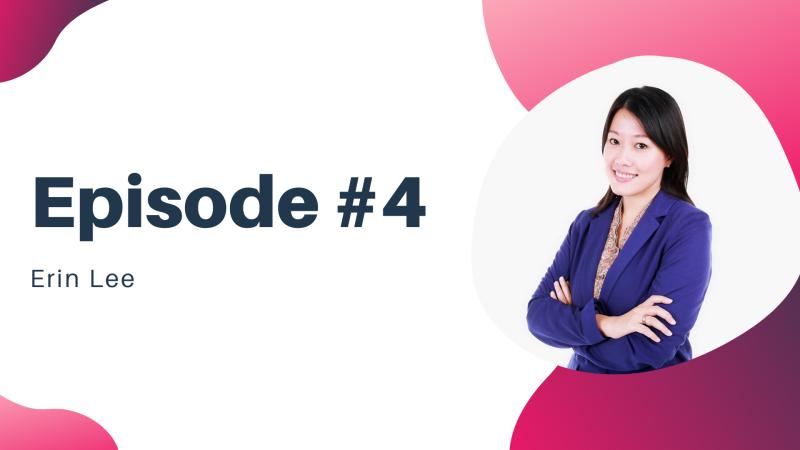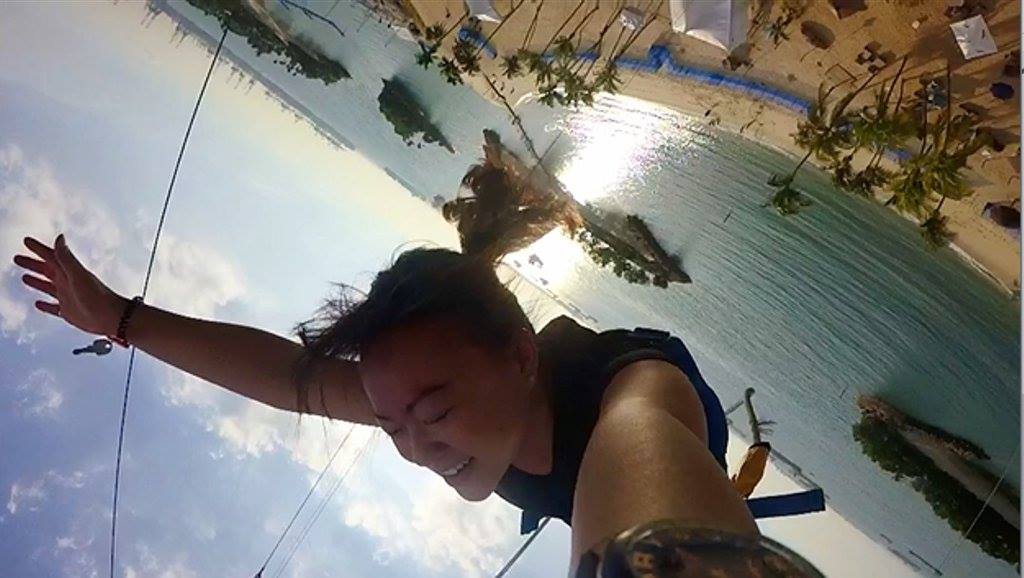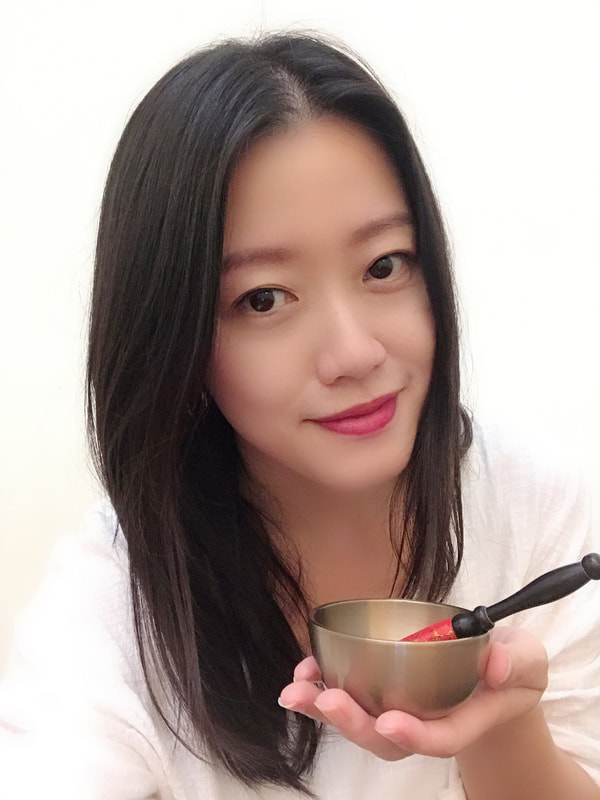|
"A person who thinks all the time has nothing to think about except thoughts." ~ Alan Watts Hence the power of mindfulness and its ability to bring you back to the present. But did you know that mindfulness can also help you reduce your level of stress? In this episode of #ekhoacademy , @Erin Lee, founder of Mindful Moments Singapore, shares with us a technique called Mindfulness-Based Stress Reduction (MBSR). Work can be stressful. And for some, it is constantly stressful. So as you prepare for the new year, why not arm yourself with a simple, yet effective way to de-stress? Episode now out on: Spotify: https://lnkd.in/f_tgEje iTunes: https://lnkd.in/fFpYaMS #podcast #stress #stressreduction #destress #mentalwellbeing
1 Comment
In The Mindful People Series, we interview people from different walks of life and get them to share their mindfulness experience, as well as how learning and practicing mindfulness have made a difference to their personal and professional lives. MiMo: How did you get into learning and practicing mindfulness? Gwen: Through a couple of articles that I read online about Mindfulness, I am always curious about how it works and to experience the effect personally rather than through the readings online. As I was reaching a state of stagnation and was searching for courses to enrich my life, this course caught my attention. MiMo: Tell us about your experience in the MBSR program. Gwen: It was an experiential learning experience for me. Without focusing on spirituality, the secular mindfulness classes showed me many ways of practicing mindfulness, it definitely allowed to me to customize my own way of practicing on a day to day basis. The group experience of practicing together also allowed me to seek comfort and support. Love to see how people find time for themselves in the midst of the fast paced society regardless of the different roles we hold. MiMo: How has mindfulness contributed to your personal well-being? Gwen: I love the process of self discovery in the midst of practicing. Understanding how my body experienced stresses, how my mind always wandered to "what's next" and my inner need of yearning for positive emotions. Most importantly, letting go and not holding on to any self judgement in the process of self realization. MiMo: How has mindfulness supported you in your professional work? Gwen: As a social worker, I work with different people on a daily basis. People from different walks of life, having different beliefs, values and expectations of others. Work can get tough especially when trying to balance relationships with different stakeholders while not compromising outcomes. In the midst of helping and supporting others, it is inevitable that we will face stresses and problems of others which led to me losing sight of myself in the process of it. Now with efforts of being mindful, I take notice and place focus on my emotional and mental well-being while responding to the needs of others. Not just to the direct beneficiaries, but also to my colleagues and the different stakeholders in my professional work. I learnt to take ownership of my own well-being so that I can better take care of others in need too. Hopefully one day, I can bring mindfulness in my work to the beneficiaries. :) MiMo: How have you incorporated mindfulness into your daily life? Gwen: I learnt to take things slower, allowing myself to appreciate the process of my usual mundane routine. Routines such as brushing teeth, drinking coffee and the walk to the bus stop were more fun when incorporating mindfulness. Noticing new experiences each day, discovering a different side of life. The formal practices placed discipline in me to set aside time for myself - my physical, emotional and mental well being. Love how I can end the day by just focusing on myself rather than thinking about my work for the next day. MiMo: Any words of advice for people who are thinking about learning mindfulness? Gwen: Practicing mindfulness is do-able and sustainable. Little steps towards mindfulness do make an impact to your life. Let the journey of self discovery begins. :) About Gwen Ho Gwen worked as a senior social worker in the social service sector supporting young offenders, youths at risk of delinquency, and young persons who experienced social-emotional issues. With relationship building as the key driver for her professional work, Gwen believes strongly that knowing herself allows her to remain genuine in the process of touching the lives of young people. Mindfulness played a crucial part to her journey of self discovery. Are you a mindfulness practitioner or do you know one who would like to share their mindfulness experience on the MiMo blog? Do drop us a message!
In The Mindful People Series, we interview people from different walks of life and get them to share their mindfulness experience, as well as how learning and practicing mindfulness have made a difference to their personal and professional lives.  MiMo: How did you get into learning and practicing mindfulness? CHS: I have always been keen to know why some individuals are able to cope with stress better than others. I have learned to notice that individuals who are able to cope with daily stress have a much happier and better quality life. My life took a turn in the early morning of 2015, when I suffered a massive cardiac arrest. That week was a very stressful week as I had to juggle work and at the same time prepare for my thesis. Later, I was told that my heart had stopped and I had collapsed while on my way to the library. I was rushed to the hospital and had an emergency procedure to remove the blockage. The doctor told me how lucky I was and the situation would have been different if I had arrived a minute later. I could not remember much except while regaining consciousness, there was a sense of regret as well as anger. I was not prepared to give up my life and felt that GOD must have made a mistake. “Clinically dead” was what the doctor told me that I had experienced; and as a result, there was an extensive damage to my heart. It has been about three years now, and I am still able to keep up with my daily 6 km walk. Now I joke about my NDE (near death experience) and the reason that I am around is because “I have forgotten to bring my MRT card while I was up there, and was thus denied entry”. Being a perfectionist, I enjoy demanding and challenging environments. This could be due to my formal training as a mental toughness and performance coach. I was blessed to have friends who recommended the mindfulness program to me, and that was how I came to know about Erin’s MBSR program. I have never regret that decision! MiMo: Tell us about your experience in the MBSR program. CHS: Every student would ask the same questions and that is whether this is the right course for them; what could they learn from this course; and how to survive the 8 weeks? I realized that not only was the program aligned to my needs, the instructions given were also clear and easy to follow. After a minute or two, Erin had me! I enjoyed the guided instructions and various class practices. It was a refreshing experience to my whole being and yet not demanding. The group discussions and sharing sessions were good and every participant had the opportunity to share their experiences. The after-class recap of the day's practice which was sent out after each session, was very helpful. It gave me the chance to reflect upon them for my home practice. I loved the mindful walking practice and it made my daily walk more enjoyable than before. I learned to appreciate and pay attention to walking, without rushing and with open awareness of my surroundings. Not only does it bring awareness to the body, it also brings calmness and clarity to the mind. MiMo: How has mindfulness contributed to your personal well-being? CHS: I have learned to manage my expectations of others. Being less judgemental and to accept situations as they are, have helped me be more composed when dealing with others. When situations arise, I learned to be more appreciative of the circumstances and accept those circumstances as new experiences. Listening more and accepting things as they are, I discovered that I am able to manage my stress level. For example, taking a breather such as a walk to the cooler corner or shifting my attention to somewhere for a short moment will help to calm the mind. The essence of mindfulness is all about non-judgment, patience, trust, and accepting the way things are. Practicing and embracing mindfulness in my daily activities have helped me to manage my stress level and emotions. This has not just benefitted my personal well-being, but also others who are around me. MiMo: How has mindfulness supported you in your professional work? CHS: Instead of pushing and demanding for results all the time, I have learned to take a step back to check my thoughts, feelings, intentions and behaviours before responding to the situation. I noticed that my colleagues are more at ease when they have issues to discuss. Mindfulness practice has opened me up to new experiences, especially in making me a better listener by being in the moment. By being non-critical and non-judgemental, I can now appreciate others' efforts in wanting to make good things happen. This new experience has helped me shape my thoughts and management style. Not only does mindfulness practice help reduce stress in the workplace, it also helps me get things done faster as people are now happier and more open. MiMo: How have you incorporated mindfulness into your daily life? CHS: Whenever there are opportunities, I will always incorporate mindfulness into my daily life. Be it at work, with friends, business associates or family. Every day we need to face challenges or engage in simple daily routine activities. Through daily mindfulness practice, one can enjoy a less stressful experience and an abundance of joy. One important lesson that I learned in the program is “Loving Kindness”. To me, that is an important part of the essence of mindfulness practice. Only with “Loving Kindness” can one understand the meaning of being non-judgemental towards another. This has helped improve my relationships with others, create better understanding, appreciate everyone's strengths and weaknesses, and this in turn brings acceptance. MiMo: Any words of advice for people who are thinking about learning mindfulness? CHS: Go with an open mind and see how the program will impact you personally and in other aspects. At the end of the program, there must be some transformation in your life. Such transformation can only be achieved through daily and conscientious practice. The beauty of mindfulness practice is that you can practice whenever you want and wherever you are. Be it resting, having a meal, walking or any activities you are doing, you can practice mindfulness. The results of such mindfulness practice are a tendency to feel less stressful, more appreciative, non-judgmental, and to have a quality of life that will benefit you, your friends and family.  About Hock Soon Hock Soon is a strong believer and advocate of achieving “Excellence” through lifelong learning. At the age of 58, he pursued his interest in Psychology at UC (Berkeley), and thereafter attained his postgraduate qualification in Business Psychology studies from Scotland. He is currently a Certified Mental Toughness Coach from the Mental Toughness Research Institute (MTRI) in the United States. He does performance and mental toughness coaching for business leaders and individuals. Hock Soon also has a specialized diploma in Child Psychology and Learning Disorder Management. He takes time off his busy schedule at work to help children with learning disabilities as a volunteer. He is also actively involved in various social projects, namely, The SGH Liver & Pancreas Cancer Support Group, The Disadvantage and Disabled Group, and other social enterprise community projects. Hock Soon believes that “to live a meaningful life, one must also be able to bring joy to others”. Mindfulness training has helped him understand and find the true meaning and purpose of life. Throughout his career, Hock Soon has won numerous awards and accolades, including the Public Service Medal and Lifelong Learning award. Hock Soon enjoys competitive sports and holds a black belt in martial arts, and is a marksman. Hock Soon believes that his mindfulness practice complements his mental toughness training and helps him to achieve his goals with much less stress. Are you a mindfulness practitioner or do you know one who would like to share their mindfulness experience on the MiMo blog? Do drop us a message!
In The Mindful People Series, we interview people from different walks of life and get them to share their mindfulness experience, as well as how learning and practicing mindfulness have made a difference to their personal and professional lives. MiMo: How did you get into learning and practicing mindfulness? Pei Fen: I had no previous experience with mindfulness practice but had heard it being used in undergraduates’ settings to reduce students’ stresses. I attended the preview session with Erin and signed up through the SkillsFuture program. MiMo: Tell us about your experience in the MBSR program. Pei Fen: I thought the 8 weeks were necessary as it gave us enough time to practice and explore various mindfulness practices. It was only when we could appreciate the bodily effects of mindfulness practice were we able to relate it to our daily lives. In fact, many of us experiences the positive effects of the MBSR programs 2-3 weeks into the practice. I have benefited much from my classmates during the program; the sharing sessions provided non-judgemental assurance since we experienced similar struggles. MiMo: How has mindfulness contributed to your personal well-being? Pei Fen: Having the knowledge and experiences of being in a mindful state of mind provides a distinct contrast to being in a frantic, restless state. First, having the awareness of myself being in a fanatic state allow me a choice to remain frantic or go for a change. Although I have just completed the 8 weeks of MBSR program, I am a more restful person than before and I am able to spot frantic moments and centre myself to focus faster. MiMo: How has mindfulness supported you in your professional work? Pei Fen: My work as a registered nurse involves countless moments of multi-tasking. Multi-tasking is seen as a virtue in many cases. However, I can name at least two moments that full attention is mandatory. First the administration of medications deserves full attention from the administrator, to reduce the risk of medication error. Secondly, being present when we are communicating with anxious or grieving caregivers. Having mindfulness skills and awareness allow me the control of my attention during important situations as such. These behaviours could improve both patient safety and experiences during their hospital admission. MiMo: How have you incorporated mindfulness into your daily life? Pei Fen: Being a fresh graduate of the course, mindfulness doesn’t come automatically. It does require a conscious effort to choose mindfulness over the hectic daily routine we so often live by. I’ve chosen mindful eating as a daily practice in appreciation of food and health. In terms of work-related stress, mindfulness has given me the opportunity to “take a pause” and to respond to difficult conversations or work arrangements. MiMo: Any words of advice for people who are thinking about learning mindfulness? Pei Fen: Explore with an open mind; we live in a shared world where many things are not within our control. However, learning mindfulness will allow us the control over one of the most powerful organs - our mind. Which can then in return allow us to shape our perspectives for all things. About Poh Pei Fen
A registered nurse, privileged to be working with ill children. In addition to the provision of care to the patients, pediatric nurses take care of the families as well. Mindfulness practices allow Pei Fen to remain centered during emergencies and the ability to provide emotional support to people even in the face of death. In The Mindful People Series, we interview people from different walks of life and get them to share their mindfulness experience, as well as how learning and practicing mindfulness have made a difference to their personal and professional lives. MiMo: How did you get into learning and practicing mindfulness? Eileen: I have always been curious about why people practice mediation or mindfulness, since they always share the many positive outcomes and benefits from their practice. By chance I read about the MBSR program and went for the preview session, which led me to signing up for the program with the SkillsFuture credits available. I attended the MBSR program with an open mind and hoped to learn how the practice could help me improve both my daily and work life. MiMo: Tell us about your experience in the MBSR program. Eileen: It was an amazing 8-week journey, especially with the interesting sharing sessions among the participants. Everyone had somewhat similar and yet different outcomes from the weekly practices. I also enjoyed the mindfulness practices as there was no need to have a particular outcome from the practices. We simply practiced to explore how we could integrate both formal and informal mindfulness into our daily life. MiMo: How has mindfulness contributed to your personal well-being? Eileen: My biggest takeaway from the program is that it has helped me to become more aware of things around me and to learn to appreciate them. Instead of always having the need to engage with thoughts or physical sensations, I am learning to rest with them from moment to moment. I find the teachings on Stress Reactivity and Stress Response very beneficial as we learned that we have choices other than reacting negatively out of habit. MiMo: How has mindfulness supported you in your professional work? Eileen: I have found that I am always too quick to react and make judgements; and having learned and practiced mindfulness, I will now do my best to take a mindful pause before reacting and try not to be unnecessarily judgmental. MiMo: How have you incorporated mindfulness into your daily life? Eileen: Mindfulness in MBSR includes practicing in various postures in both stillness and movement, and hence it supports me in many aspects of my life. The movements practice has encouraged me to sign up for yoga classes for my long-term wellbeing, and I plan to incorporate mindful awareness during yoga practice. MiMo: Any words of advice for people who are thinking about learning mindfulness? Eileen: Go in with an open mind, learn the different practices and apply what works best for you. You will learn to appreciate things and people more and to not be too judgmental. You will learn how you are able to manage stress better and how to bring a mindful pause to break our reactive patterns, as well as change our relationship with stress.  About Eileen Foo Being a HR Practitioner with an MNC in retail requires me to work with both internal and external clients from different parts of the world. We need to be aware of the different work and personal cultures so as to build trusting and good relationships. I always do things with an open mind by accepting changes as part of life's process, and I believe that change is always for the better. My personal interests have evolved over time and I am now more focused on developing my personal wellbeing both physically and mentally; I believe that having a healthy mind is just as important as having a healthy body. Traveling is my biggest love and I am now exploring more off-track places as well as challenging activities during my travels, such as caving, water rafting and trekking. My belief in life is to have inner peace that will lead to happiness as well as a healthy mind and body. Are you a mindfulness practitioner or do you know one who would like to share their mindfulness experience on the MiMo blog? Do drop us a message!
In The Mindful People Series, we interview people from different walks of life and get them to share their mindfulness experience, as well as how learning and practicing mindfulness have made a difference to their personal and professional lives MiMo: How did you get into learning and practicing mindfulness? Wanyin: I had been hearing about the benefits of mindfulness via FB and in the news, and was keen to learn something new. With so much going on at work, it's hard to "switch off" after work and I was hoping that mindfulness could help with that. MiMo: Tell us about your experience in the MBSR program. Wanyin: The practices were simple to follow, and not as complex as I had envisioned before the programme started. The challenge was to find the discipline to keep up with the daily practices, and being deliberate about applying what I've taught as I go about my usual routine. What I really found useful was the realization of how a 10-min breathing exercise was able to help me better focus and calm down. MiMo: How has mindfulness contributed to your personal well-being? Wanyin: Two key areas: firstly, mindfulness underlines the importance of staying grounded and focused on the present. Secondly, to have a greater acceptance towards myself and appreciation for impermanence state of things. MiMo: How has mindfulness supported you in your professional work? Wanyin: When faced with unpleasant encounters at work, I remind myself that things will not stay this way forever, and that feelings / events (both good or bad) will eventually pass. Similarly when dealing with my colleagues, I believe that being kind is a choice, and when faced with tense situations, you can actively choose not to react, but choose to respond kindly. MiMo: How have you incorporated mindfulness into your daily life? Wanyin: Using an app, I've been trying to alternate between a 20 min movements practice, and the 20/30min awareness of breath practice. When out with friends & family, I try to be present and centered so that I can enjoy their company fully. MiMo: Any words of advice for people who are thinking about learning mindfulness? Wanyin: Go for it. The practices aren't hard to follow. The challenge is to find ways to incorporate mindfulness into daily life, and to keep at it.  About Luo Wanyin Regular Singaporean who loves good food, and is constantly looking to travel beyond our little island to discover new places, gain experiences, and create happy memories. On top of all these, Wanyin is also working on incorporating mindfulness into her daily routine so as to be more present and grateful for all around her. Are you a mindfulness practitioner or do you know one who would like to share their mindfulness experience on the MiMo blog? Do drop us a message!
In The Mindful People Series, we interview people from different walks of life and get them to share their mindfulness experience, as well as how learning and practicing mindfulness have made a difference to their personal and professional lives  MiMo: How did you get into learning and practicing mindfulness? Sherry: I was given heavy responsibilities at work and dealt with stakeholders who demanded a lot of time and energy. I would start each work day feeling unrested and drained, and over time I had to summon a lot of self-control and use a great sense of responsibility to complete whatever I needed to do. Other challenges in life depleted my energy further and I needed to find a better and more constructive way to manage my stress and mental fatigue. After months of social isolation, I met up with a friend who benefited from Erin’s MBSR program so I started reading up about mindfulness and discovered that it was exactly the skills I needed to handle life’s challenges! MiMo: Tell us about your experience in the MBSR program. Sherry: Erin gave us weekly practices with guided meditation audio recordings to keep up with daily meditation. These weekly practices helped me to reflect on how I had been dealing with life and how I can apply mindfulness for better quality of life. When things were busy at work, it was tempting to skip practices but the MBSR program will be effective only if one makes the best out of these 8 weeks and follows the weekly practices closely. The Circle of Awareness to break the habit loops and Erin’s theoretical explanations about MBSR were most helpful to me as it clearly articulates the neuroscience behind why the MBSR program will work. The 1-day silent retreat was my favourite part of the program as it was only at the retreat that I felt like “I finally got it!” – I was better able to embrace the skills taught in the first 5 weeks and understood how meditation can be practised on-the-go, every day, every moment! MiMo: How has mindfulness contributed to your personal well-being? Sherry: Mindfulness has helped me to look inward and gain fresh perspectives about life’s challenges. It has helped me to reduce mental noise and break habits of cyclical thinking to be more present with life’s moments. I realized that the anxiety and worries in everyday life could be halted simply by being more aware of the present and to let things “be”, instead of doubting and judging whether things should be another way (in the past) or could be a certain way (in the future). I am able to build my natural resilience by acknowledging the present difficult situation with the help of mindful breathing and then calmly deciding my next course of action without unnecessarily depleting my mental (or physical) energy. I am also better able to appreciate the present for what it “is”. MiMo: How has mindfulness supported you in your professional work? Sherry: I am better able to manage my anxiety and be more open-minded to alternative approaches to issues at work. I can appreciate each moment better instead of constantly worrying about the next task. Whenever I encounter challenging situations or people at work, I am better able to re-centre my mind so as not to emotionally engage with the situation or person. I have also learnt to be less judgmental of my negative emotions and thoughts and acknowledge them instead of berating myself for having them. MiMo: How have you incorporated mindfulness into your daily life? Sherry: I do simple meditation practices daily to take a pause from the hectic work schedule and improve my foundation in mindful living. Instead of habitual cyclical thinking, mindfulness brings me back to the present moment and reduces my anxiety. It helps me to be appreciative of life and embrace its moments, to be kinder to myself so that I can extend compassion to others. Whenever I encounter a stressful situation, I am able to break the stress reactivity cycle through mindful breathing so that I can respond more constructively. MiMo: Any words of advice for people who are thinking about learning mindfulness? Sherry: Mindfulness reminds us to “be” as we are and helps us learn to accept life and its challenges as they come. We are caught up in “doing” things, searching for solutions by constantly analysing problems. Our minds are overworked and we feel unrested and continue this cycle either until we bounce back by seeking a change (which might or might not be helpful), or until we want to end our suffering. By practising mindfulness, we do not forget or escape from our challenges, and still need to face them and overcome them eventually, but we can handle stressful situations more constructively and not destroy ourselves in the process. By observing stressful feelings moment by moment and noticing things as they are, we can allow our minds to rest, then return to it when we are less emotional and more rational to handle it. ------ About Sherry Lim Sherry grew up in Singapore and has worked in the education industry for more than five years. Through her work, she seeks to understand how people learn, and why people are the way they are. She enjoys reading books and articles, particularly in the areas of neuroscience and psychology, to complement her work. She is an avid seeker of meaningful experiences and loves to learn new things across varied topics. She believes in balanced living and is self-motivated in doing at-home workouts, eating a variety of foods, and practising mindfulness in protecting one’s physical, emotional and mental health. Are you a mindfulness practitioner or do you know one who would like to share their mindfulness experience on the MiMo blog? Do drop us a message! Deep gratitude to Her World magazine for featuring Mindful Moments in their April 2018 issue, as well as for writing about why we should pursue mindfulness and how we can practice it daily!
|
About The AuthorMiMo founder Erin Lee is a Mindfulness Coach and MBSR Teacher at Mindful Moments, and advocate of mindfulness as the way of life. She conducts the classic 8-Week MBSR Program, as well as the 8-Week MBSR Workplace Program. Categories
All
ContributeAre you a mindfulness practitioner and have meaningful experiences or thoughts about mindfulness that you'd like to share? You can contribute an article on the MiMo blog! Please contact Erin to find out more.
Archives
June 2021
|















 RSS Feed
RSS Feed